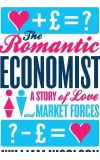
26 Feb 2013 13:13:00
Right at the end of The Romantic Economist – non-spoiler alert! – the author William Nicolson starts referring in the third person to "William Nicolson", the protagonist of the last 190-odd pages. It was an unsettling moment. I had imagined that I was reading a straightforward personal reminiscence; "a memoir with an economic twist" is how Nicolson describes it early on. Now my brain frazzled with the idea that the book was an altogether more postmodern exercise. "What the hell is going on?" I said out loud. I was reading it on a plane and the man next to me shifted uneasily in his seat. It's a stunt you might expect from a young, smart aleck American author determined to reinvent the novel (again). I thought of the Martin Amis character in Money or the TV series Bored to Death, where a real-life novelist from New York called Jonathan Ames created a lead character called Jonathan Ames, who is also a novelist from New York. Or perhaps Nicolson was alluding to James Frey, author of A Million Little Pieces, the memoir that turned out not actually to be a memoir.
Up to this point, The Romantic Economist had displayed very few tricksy traits. It seemed, in fact, disarmingly simple. From the early chapters and the back flap, we learn that Nicolson is a young man – now in his mid-20s – who studied politics and economics at university before training as a solicitor. (He is also a part of a literary dynasty that includes his father, Adam, an author and historian, and his aunt, Rebecca, founder of Short Books, William's publisher.) The book came out of an attempt to apply economic principles that he was learning about at university to his misfiring love life.
It's a neat idea and Nicolson is a likable, self-deprecating narrator. His adventures with the opposite sex take in lots of university high-jinks, where pickings are slim, and a wedding of a friend's older brother, where he finds women in their late 20s are "approachable, friendly and… up for it". In New Orleans, on his gap year, he tries to save money on accommodation by playing "sex or freeze": gambling that his British accent will find him a bed for the night. When that doesn't work, he is reduced to begging a policeman to arrest him for underage drinking.
Throughout, Nicolson sprinkles his tale with game theory and principles of economics, such as bargaining power and supply and demand. Some of these closely map with his experience: for example, he compares the choice between a volatile but exciting single life and the steady existence of a long-term relationship to the decision of an investor to stick their savings in a bank or gamble them on stocks and shares. On other occasions, the links between market forces and romance feel forced. Many pages are wasted on his paranoid belief that restaurants hold up to three wine lists because they know that customers often choose the second-cheapest bottle.
So, is The Romantic Economist true or not? Is Nicolson going to be confronted by Oprah, like Frey was? Eventually, I decided to call the book's publicist. I was not the first person to ask: yes, the book is based on first-hand experience, she said, but by the time that Nicolson finished writing it he had changed his view on some key areas. Now, at the ripe old age of 26, he did not always relate to his younger, student self. From an author, it's a strange loss of confidence but, in a sense, Nicolson's right: The Romantic Economist is only sporadically enlightening on romance and economics. As a memoir, though, it is rather sweet.

